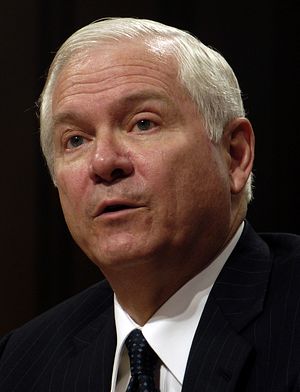A few mid-week defense and security links for Flashpoints readers:
Former U.S. Defense Secretary Robert Gates’ new memoir Duty: Memoirs of a Secretary at War offers a scathing critique of President Obama’s leadership style, particularly in the case of the Afghan war. Gates writes that by 2010 he had concluded that the president “doesn’t believe in his own strategy, and doesn’t consider the war to be his. For him, it’s all about getting out.” In a long piece over at The Washington Post, Bob Woodward examines the troubled relationship between Obama and Gates, who mostly remained silent during his actual tenure as Defense Secretary but is now speaking out about his grievances against the administration. Gates also criticizes other Obama administration officials. He contends that Vice President Joe Biden was “poisoning the well” against military leaders, and that Thomas Donilon, as deputy national security adviser, and Lt. Gen. Douglas E. Lute were both regularly prone to “aggressive, suspicious, and sometimes condescending and insulting questioning of our military leaders.” The book looks to be a timely insider account from a cabinet official who oversaw a critical moment in the United States’ military history, and a rare criticism by a former a cabinet member of a sitting president.
Over at ArmsControlWonk, Michael Krepon asks the very important question: Whatever Happened to Minimum, Credible Deterrence? Krepon examines the disconnect between stated nuclear doctrines in both India and Pakistan and the actual progression of their nuclear weapons programs since both countries tested nuclear weapons and declared themselves to be nuclear weapon states in 1998. A fascinating graphic demonstrates the speedy progression of nuclear weapon delivery mechanisms versus the rather slow progression of diplomacy, confidence-building measures, and nuclear risk reduction mechanisms. Since the Mumbai attacks in 2008, India and Pakistan have made virtually no progress in the latter category, but delivery methods continue to develop. Krepon also discusses the triangular nature of nuclear competition between India, Pakistan, and China, which adds a complex geopolitical angle to deterrence on the subcontinent. Krepon’s post distills the content of a lengthier edited volume by The Stimson Center, Deterrence Stability and Escalation Control in South Asia – something I’ve begun reading and recommend to any Flashpoints readers interested in grokking the current state of deterrence in the subcontinent.
India and Japan kicked off 2014 together by deciding to “further consolidate and strengthen their strategic and global partnership” in the area of defense cooperation. The two resolved to conduct regular joint combat exercises and military exchanges, all in the interest of anti-piracy, maritime security and counter-terrorism – definitely not China. Defense ministers A. K. Antony of India and Itsunori Onodera of Japan met in New Delhi to discuss defense matters.
India meanwhile picked up some Heron UAVs from Israel in a $300 million deal. This deal comes on the heels of India’s recent purchase of Israeli Barak-I missiles.
The U.S. Department of Defense waived rules that prevented Chinese-made parts from making their way into the F-35. According to Reuters, “chief U.S. arms buyer Frank Kendall allowed two F-35 suppliers, Northrop Grumman Corp and Honeywell International Inc, to use Chinese magnets for the new warplane’s radar system, landing gears and other hardware.”
Writing for The Washington Post, Michael O’Hanlon of Brookings argues that the recent National Intelligence Estimate (NIE) report on Afghanistan is “too pessimistic.” O’Hanlon writes that due to the performance of the Afghan army and police, the shape of the presidential race, and Karzai’s reluctant pragmatism over the BSA, Afghanistan’s future could be hopeful.

































